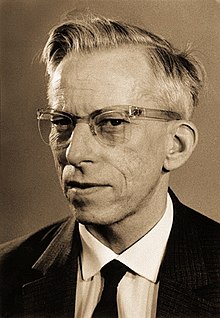Otto Wichterle
Otto Wichterle (born October 27, 1913 in Proßnitz in Moravia ; † August 18, 1998 in Stražisko in Moravia) was a Czech chemist . He is considered the inventor of modern (soft) contact lenses and the synthetic fiber Silon.
Life
Wichterle studied at the Chemical University of the Technical University in Prague . He received his doctorate in 1936 and initially stayed at the university until the National Socialists closed the university in 1939. Wichterle switched to the research department at the Bata works in Zlín , where he mainly researched the processing of polyamides and caprolactams . In 1941 he and his team invented a synthetic fiber called Silon . However, the invention was initially kept secret and only entered industrial production ten years later. In 1942 Wichterle was briefly imprisoned by the Gestapo.
After the Second World War , Wichterle returned to the university, did his doctorate with a thesis on organic chemistry and wrote a basic textbook on inorganic chemistry . In 1952 he was appointed dean of the newly established Institute for Chemical Technology, but removed from this post in 1958 as part of a political cleansing operation.
Just one year later, the Czechoslovak Academy of Sciences , of which he had been a member since 1955, elected him to the head of a new institute for macromolecular chemistry. At this institute he continued his research on the polymerization of lactams and the processing of hydrophilic gels . As early as 1953, together with the chemist Drahoslav Lím, he had a process for the production of a soft polymer ( 2-hydroxyethyl methacrylate , or HEMA for short) patented.
Because the establishment of the institute took a long time, Wichterle had to carry out a large part of his experiments at home. There, in 1961, he succeeded in producing hydrogel contact lenses with a self-made device that he had made from the Merkur construction kit intended for children . In total, he made 5,000 contact lenses at home. The Academy of Sciences sold the patents to the USA without any knowledge .
In 1970 Wichterle was also removed from the head of this institute, this time due to his role in the creation of the Manifesto of 2000 Words , which called for the unconditional continuation of the reform policy of the Prague Spring . As a result, Wichterle's scientific work was also made more difficult because he was often forbidden to have contact with colleagues, especially from abroad. It was not until the Velvet Revolution of 1989 that Wichterle was fully rehabilitated. From 1990 until the dissolution of Czechoslovakia , he served as President of the Czechoslovak Academy of Sciences and was then made Honorary President of the Czech Academy.
Appreciation
The Wichterle reaction he described in 1948 was named after him.
In 1993 the asteroid (3899) Wichterle was named after Otto Wichterle.
In 1984 he received the RW Wood Prize .
The Otto Wichterle Prize is awarded to young scientists by the Academy of Sciences .
literature
- Wolfgang U. Eckart and Sibylle K. Scholtz: Soft gel for a sharp look. Forty years ago, the production of modern soft contact lenses began. A retrospective recalls the inventor of the first soft lens material Otto Wichterle , in: Der Augenspiegel , Ratingen 2004, 50 (9), pp. 38–39
Individual evidence
- ^ Stanislav Kamenský: Otto Wichterle. Génius z Prostějova, díky němuž lidé odkládají brýle. In: idnes.cz. August 17, 2013. Retrieved June 19, 2018 .
- ↑ Contact Lenses - Invention of the Century. In: 321linsen.de. Maternia sro, accessed on July 9, 2018 .
- ↑ Otto Wichterle Prize went to twenty young scientists on Radio Prague on May 23, 2007, accessed on August 18, 2012.
Web links
- Literature by and about Otto Wichterle in the catalog of the German National Library
- Literature and other media by and about Otto Wichterle in the catalog of the National Library of the Czech Republic
- Article about Wichterle on Radio Prague (in English)
- Professor Otto WICHTERLE (1913-1998) ( Memento from July 25, 2009 in the Internet Archive ) on the homepage of the University of Chemistry and Technology, Prague (in English)
| personal data | |
|---|---|
| SURNAME | Wichterle, Otto |
| BRIEF DESCRIPTION | Czech chemist |
| DATE OF BIRTH | October 27, 1913 |
| PLACE OF BIRTH | Proßnitz , Moravia |
| DATE OF DEATH | August 18, 1998 |
| Place of death | Prague |

